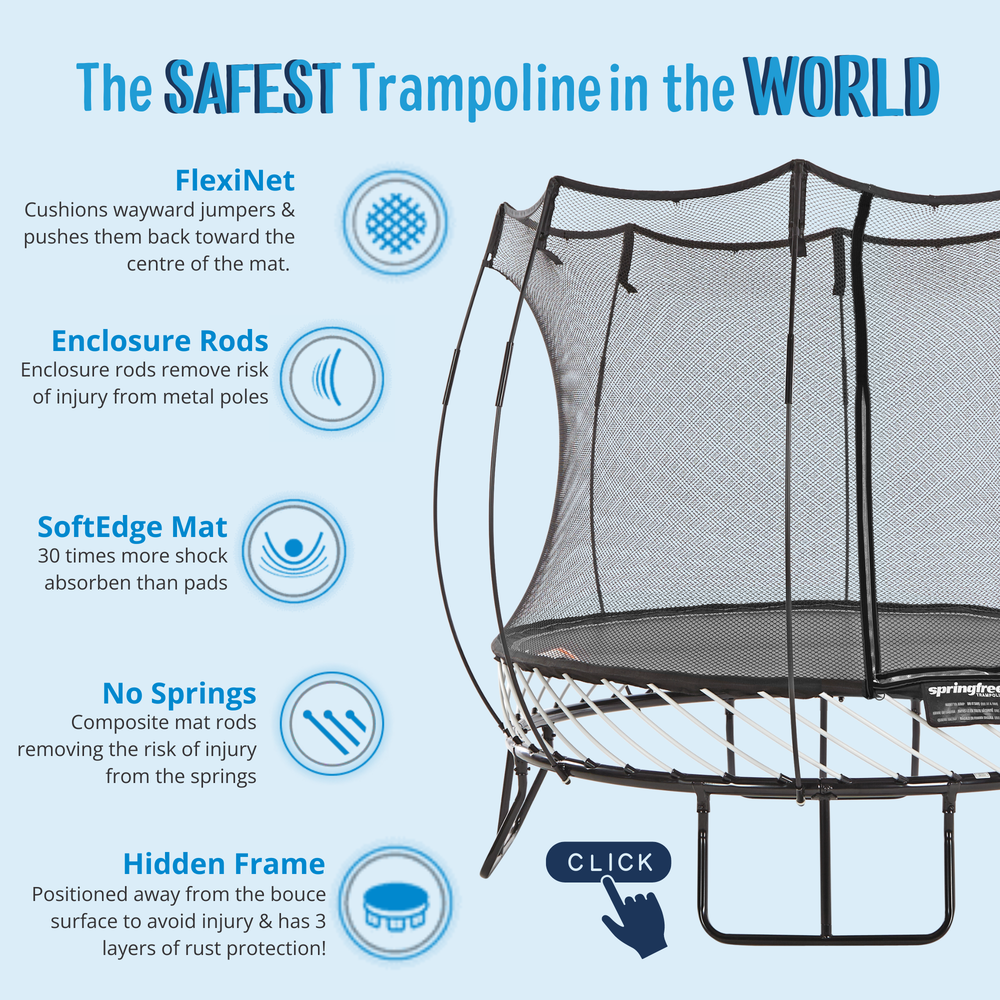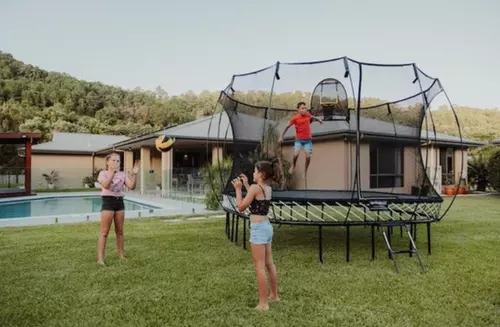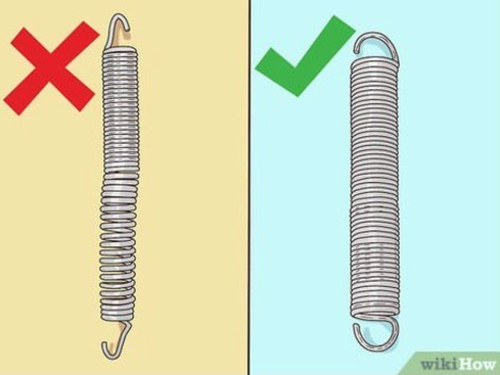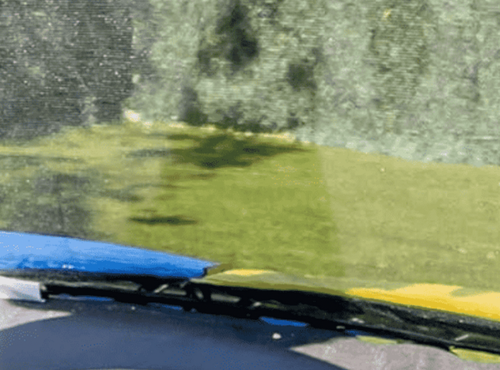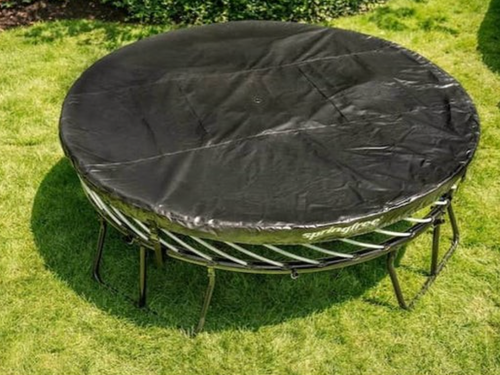If you’re here, you must be wondering – “How can I make my trampoline safer?”
There’s no denying that trampolines can be dangerous IF you use them improperly or have a low-quality model.
We created the world’s safest trampolines, so you could say we’re THE experts on trampoline safety.
This article will tell you exactly how to make your trampoline safer with four proven strategies.
How Do I Know If My Trampoline Is Safe?
With any trampoline, either new or used, there are safety features that must be present to ensure a safe jumping experience.
Here are the trampoline safety features to look for on your trampoline:
- An enclosure net that flexes and/or is made from strong, UV-resistant material.
- No springs or quality safety padding over the springs (you also want to see the springs outside of the mat area).
- The use of enclosure rods or curved poles that are padded.
- A shock-absorbent trampoline mat with no hard edges.
- A galvanised trampoline frame that is properly padded or hidden.
- The use of weather-resistant, rust-resistant and UV-protected materials.
These features are instrumental to a trampoline’s safety. Without them, trampoline injuries could become more common.
7 Steps to Evaluate Your Trampoline for Safety
The thing about trampolines is they can all look nice and safe in the pictures.
But once you jump on it for six months, you start to realise that it may not perform as well.
If you have a trampoline that has already been used, you must assess its current condition before taking any action to make it safer.
Here’s a step-by-step process on how to do this:
Step 1: Check to make sure your trampoline frame and legs are sturdy, and the structure is stable. Also, assess for damage, rust and wear-and-tear.
Step 2: Do a close inspection of the metal springs (or rods) and ensure that there is no significant rust build-up. If you have springs, make sure they are not stretching (this is a sign of age).
Step 3: Examine the trampoline mat for tears, holes or excessive wear. Also, examine whether there are gaps between the mat and net, like the one below.
Photo courtesy of Google.
Step 4: Inspect your trampoline enclosure net for tears. If your trampoline doesn’t have a net, DO NOT jump on it. The zipper should also be fully functional.
Step 5: Ensure that the padding on the trampoline is firm and intact. Areas that should have padding include the frame, springs and poles.
Step 6: Check the condition of any trampoline accessories you have. This may include a basketball hoop, ladder or anchors.
Step 7: Look at your manufacturer’s guidelines for trampoline weight limits. If your kids have grown, they might now exceed the trampoline’s individual weight capacity!
Once you’ve evaluated your trampoline, you’re ready to take action.
How to Make Your Trampoline Safer (4 Options)
Here’s the good news: There are ways to make your trampoline safer.
Here’s the bad news: It might cost money, and time and may not be a permanent fix.
You have four ways to make your trampoline safer – let’s run through them to find the one for you.
Option 1: Replace Old Parts
Replacing trampoline parts is essential to maintaining a trampoline.
Even higher-quality trampolines, like ACON, JumpSport and Springfree, will need to have parts ordered and replaced at some point.
If you like your current trampoline but have noticed signs of wear, order replacement parts immediately.
Jumping on a trampoline with failing parts can be dangerous.
When you will need to replace parts on a trampoline depends on the brand/model you own. Cheap trampolines (£200-£400) might not last a year before needing the padding or springs replaced.
The key hint for how long a trampoline will last before needing replacement parts is the warranty length.
When checking your trampoline’s warranty, look for:
- How long the warranty is for each part.
- Which parts are covered.
- What they are covered for (most are for manufacturer defects only).
The downside to replacing parts is the costs add up over time. Replacement parts can range from £10-£200 or more depending on the part.
On a cheap trampoline, it’s oftentimes more cost-efficient to replace the trampoline altogether than replace parts.
Tip: Periodically cleaning your trampoline with soap and water can help protect your trampoline from wear and tear. It’s also fun for the kids!
Option 2: Buy Trampoline Accessories for Safety
Another way to make your current trampoline safer is to buy trampoline accessories.
There are many accessories for a trampoline, and some will increase your trampoline’s safety rating.
These might include:
- A trampoline ladder to help with getting on and off the trampoline.
- Trampoline wheels to help safely move the trampoline manually.
- Trampoline anchors to offer extra stability (important for heavy wind regions).
There are also trampoline sunshades and trampoline covers that will help a trampoline sustain through direct sunlight (a trampoline’s worst enemy). This indirectly makes the trampoline safer by keeping it in good condition for longer.
Option 3: Enforce Trampoline Safety Rules
This option involves no money at all.
But it might be the most effective of the three options we’ve discussed so far.
Many trampoline injuries can be avoided if you follow basic trampoline safety rules. These should include:
- One jumper at a time – trampoline danger statistics say that 75% of trampoline injuries occur with multiple children jumping at the same time.
- Always supervise young children.
- No flipping or tricks unless you’re professionally trained.
- No roughhousing.
- No pets (sorry to the family dog).
- Never go underneath the trampoline.
- Jump in the centre of the mat (the safest part).
Set clear expectations that rules are to be followed when jumping on the trampoline.
Seriously – it could be the difference between suffering an injury and jumping safely.
Option 4: Buy a New Trampoline
This last option will likely be the costliest upfront. But it could also be super necessary.
Like any product, trampolines can wear down (some much quicker than others).
If you are constantly replacing parts, or your trampoline looks finished, it’s probably time for a trampoline replacement.
As we mentioned earlier, low-quality trampolines likely won’t last past 1-3 years without significant maintenance.
If you have an old trampoline but you and/or your kids want to jump long term, investing in a high-quality trampoline is worth it.
Why? They are much safer, last longer without needing strenuous maintenance and look better in your garden.
High-quality trampolines cost anywhere from £800-£4,000 or more. It is a big investment (trampoline financing is offered by some brands).
But if you’re looking for a long-term, safe trampoline, it’s a worthy investment. Otherwise, you will be stuck recycling through cheap low-quality models every couple of years.
Is It Time to Upgrade Your Trampoline?
Okay, we’ve run through your options on how to make your trampoline safer.
Now, it’s time to take action.
Option #1: If you want to replace parts, go to your manufacturer’s website or contact them directly.
Option #2: Same with accessories. If you want trampoline accessories, look toward your manufacturer.
Option #3: Safe jumping rules – everybody should incorporate these!
Option #4: Check out our best trampolines for 2024 if you’re looking for an upgrade.
Happy (and safe) jumping!







